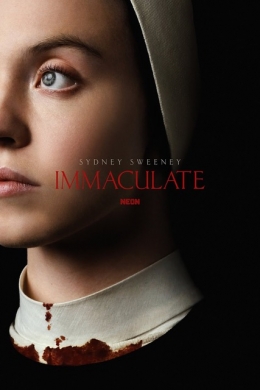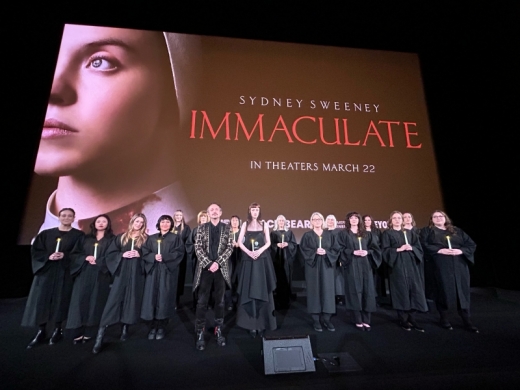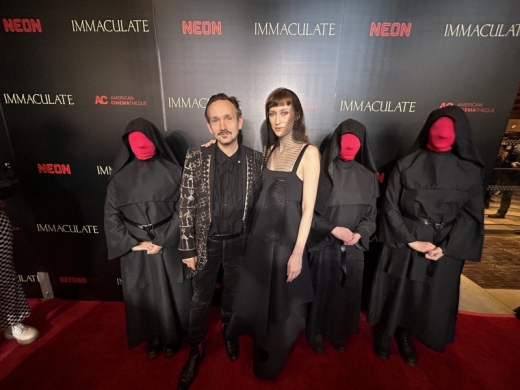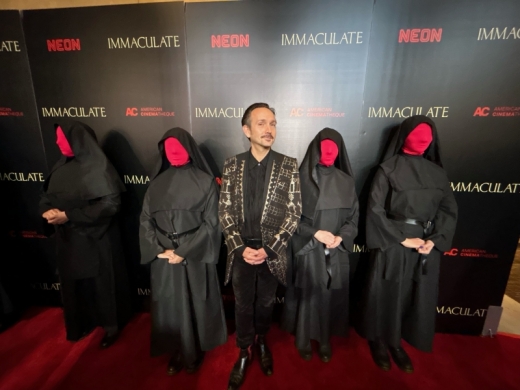Interview With Composer Will Bates for Score of Michael
Mohan’s IMMACULATE; Premiere at SXSW

Composer Will Bates has composed original scores for a myriad of filmmakers including acclaimed directors Mike Cahill (Another Earth; I Origins; Bliss), Alex Gibney (We Steal Secrets: The Story of Wikileaks; Going Clear: Scientology and the Prison of Belief; Zero Days; The Forever Prisoner), Ry Russo-Young (You Won’t Miss Me; Nobody Walks) and Fisher Stevens (Mission Blue; Bright Lights).
Bates’ upcoming projects include Dark Sky Films’ Blackout, directed by Larry Fessenden and starring Marshall Bell, which hits theaters (limited run) on March 13th. Notable credits include Craig Gillespie’s Dumb Money; FX’s Class of ’09; AMC+’s Anne Rice's Mayfair Witches; Dean Craig’s comedy film The Estate; Michael Mohan’s thriller The Voyeurs; Michael Tyburski’s drama film The Sound of Silence; Starz's Sweetbitter; and the drama/sci-fi series Away; Netflix’s Golden Globe and Emmy-nominated mini-series Unbelievable; and the thriller limited series Devil in Ohio; SyFy’s hit series The Magicians; the George R.R. Martin produced series Nightflyers; Hulu’s series The Path; Chance; and The Looming Tower; NBC’s Rise; and more. Bates’ recent score for Michael Mohan’s Immaculate, starring Sydney Sweeney, premiered at SXSW on Tuesday, March 12th and hit theaters on March 22nd.
In an interview with Will Bates after the festival, here is what he had to say:
Can you tell us about your music background and what led you to film scoring?
WILL: I’ve always wanted to be a film composer. I think I was about 6 or 7 when I sang the entire score of Star Wars to my parents one morning. And once I realized that one man was responsible for all the tunes I’d been humming in my head, I decided I wanted to be John Williams when I grew up. I started playing the saxophone and at about 12 or 13 I got very into jazz. I had a rethink and thought maybe I’d like to be Cannonball Adderley instead. With my buddy Quentin Collins, I started playing in jazz clubs and bars around London from the age of about 14, masquerading as an 18-year-old, wearing my dad’s oversized suits. Then I discovered electronic music and released some obscure dance music on tiny London labels. I later moved to New York and became the lead singer of an Indie Rock band called The Rinse. We toured the US, opened for some big bands, and had a record released in Japan. But generally, we somehow dodged success like skilled ninjas. But all through that time, my lingering first love of scoring remained. The only way I ever learnt to support myself was by scoring commercials, first in London, and finally landing myself a gig as an in-house composer at a New York-based music house. That was a day job, and I rather naively thought that it would also be a route into scoring movies. Of course it wasn’t! But it did teach me a vast range of musical skills and speed. Eventually I met some filmmakers from the New York mumblecore scene and found myself scoring my first feature. That one went to Sundance and finally kicked things off.
Can you tell us about the process of scoring? Does the scoring come after the edit or during?
WILL: It varies from project to project. Sometimes I’ll start at the script stage, sometimes I’m looking at a locked cut. But generally, it begins the same for me; I’ll have a spell behind the piano or some other instrument, searching for a melody or chord sequence that’s connected to a character or scene. I begin searching for the eureka moment when I find that thing, a feeling that one couldn’t live without the other. This is normally accompanied by a heavy dose of panic and terror as I drive everyone around me crazy. Once my wife has reassured me that there are in fact some unused melodies left in the universe, I’ll find the thing I’m looking for and move on. I work very quickly after that. When it’s going well the stuff feels like it’s writing itself. But that first part is the hard part!
Do you have a project you have worked on that you are most proud of thus far?
WILL: The projects I’m most proud of tend to be the ones I’ve just finished! I become so deeply involved and emotionally connected to characters while I’m working. As composers we become these experts of our own tiny universe. I could write a full dissertation on the nuance of a character while I’m doing the job. But then once that is over it is replaced by the next one. It makes it hard to look backwards.
Why are film scores so important in your mind? Is a film complete without a score?
WILL: Music is such a powerful tool. It can provide subtext, a deeper meaning, it can amplify what’s on screen and guide an audience through context. What it can’t do is correct something that isn’t there. On occasion we’ve all been asked to help with a performance through music, which is something I tend to shy away from. I feel that’s more of an editor’s job! Is a film complete without a score? Possibly. I think you’d have to ask the director.
Who have been some of your greatest inspirations?
WILL: Well, John Williams has a lot to answer for. And there are plenty of others. The first record I bought as a kid was Ennio Morricone’s The Good the Bad and the Ugly. To this day I can’t understand how someone could pick all those colors out and have them make sense. Vangelis’ score to Bladerunner was the gateway drug to an unhealthy addiction to analog synths. Bernard Herrmann’s string writing has made a deep impression on me. But outside of those guys, I think Miles Davis reigns supreme. From Birth of The Cool to Tutu, I love all of it. He just kept ploughing forward. His collaborations with Gil Evans are very special to me.
When did the film Immaculate come your way and what made you fall in love with it?
WILL: I worked with Michael Mohan on his previous movie The Voyeurs. That one was a fast but delightful process, and I immediately got a great vibe from him. We became good mates after that. When Sydney asked him to direct Immaculate he sent me the script and I was blown away. I always knew this one was going to be special, but when they were filming in Rome, Mike sent me the dailies of that final scene. The first take (which is what ended up in the film) was the first bit of footage I watched, and I just couldn’t believe it. What Sydney does with that scene is just extraordinary. Her performance was so inspiring for me and honestly it just kickstarted my whole process.
Can you tell us about the film and the music?
WILL: This was one of those rare occasions where I was involved very early. The first task was to compose some pieces that were needed for the shoot. Michael and I discussed instrumentation for the scenes where nuns are playing music and landed on Zither, Psaltery and Autoharp which were then sourced in Rome for the actors to play. I wrote sketches using those instruments that were then used as templates for the onset performers. And those sketches became a blueprint for where we would go with the score once we got to post-production. A larger task was the piece that the nuns are singing during Sister Celia's ceremony. It needed to be in Latin, so I used the text of the Te Deum prayer. Its tone reflects Sister Celia's own feelings of spirituality at the beginning of her story, a sense of wonder and awe towards God. It needed to sound ancient, but somehow specific to this sub-sect of the Catholic Church. I used a Hungarian Zither as my starting point for the piece, which has its own very specific modal folk scale. Moving forward with the score, I often used this scale as my tonal center; it places some of the more familiar ecclesiastic tones in an unfamiliar setting. Along with large Tenor and Bass Recorders for woodwind accompaniment and a Hurdy-Gurdy; there is something familiar but also unnerving.
WILL CONT’D: I asked my frequent collaborator Maiah Manser to sing the vocals for the Te Deum before handing it over to the choir to sing. I used a wonderful group in London called the Hi Lo Singers. Vocals just seemed to fit so perfectly into the world we were creating, so I wrote another piece for Sister Cecilia's arrival at the convent using the Latin text from the Kyrie Eleison movement of the Requiem Mass. Again, I had Maiah record those, and this melody became Sister Cecilia's theme in the movie.
The film premiered at SXSW. How was that experience?
WILL: It was like a rock concert honestly. I don’t think that screening could have gone any better. People were freaking out; cheering, screaming, laughing. Working so closely on movies, you can become a little desensitized to them whilst focusing on the technicalities and the minutia. So, it was a great reminder of the power of watching with an audience who had never seen it before. And Neon has been amazing. They had the idea of getting a choir of nuns to sing the Te Deum which I conducted onstage right before the screening started. It really set the mood!
How has the audience's reaction been? Where can people see the film?
WILL: The reaction has been incredible. We always thought that it would be somewhat divisive, but honestly, I think people have united around Sydney’s extraordinary performance. It’s undeniable. No one has seen her do anything like this before and I feel so honored to be part of it.
What will you be working on next?
WILL: I just finished the soundtrack album to another movie that’s about to be released, Larry Fessenden’s Blackout.



Interview by Vanessa K. McMahon
166